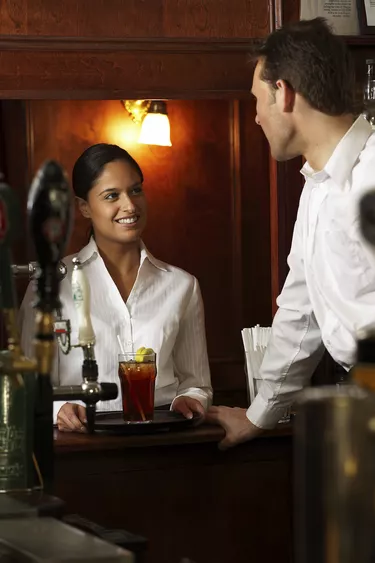
Bartenders employed in the restaurant, nightclub or hospitality industries may be eligible for a variety of tax breaks. Though the Internal Revenue Service does not provide any tax credits specifically for bartenders, they qualify for many general deductions. Some of these include travel expenses, clothing, occupational equipment and allocated tips.
Gas and Mileage
Video of the Day
The IRS allows bartenders to deduct the expense of traveling to and from work on their tax returns. Certain conditions apply, but this deduction is fairly simple to claim. The standard mileage rate includes gas and vehicle depreciation. Apply this as a local transportation expense at 55.5 cents per mile as of 2011. You must own or lease the vehicle and have claimed the standard mileage rate from the first year it was used for work or the part of the leasing period post 1997. Bartenders claiming this deduction use IRS Form 2106-EZ. Only the mileage used for business travel is eligible for deduction.
Video of the Day
Shoes and Uniforms
Many bartenders wear required uniforms and sometimes special shoes. Whether you wear a full tuxedo-style uniform or just a shirt displaying the company logo, if you are not provided with or reimbursed for such items, deduct them. In fact, even the costs of dry-cleaning your uniform are deductible. Special safety shoes enhanced with nonskid soles or steel-tipped toes are deductible as well as aprons, name tags and other uniform accessories.
Work Tools and Supplies
Some drinking establishments do not provide work tools such as corkscrews, bottle openers, shakers, strainers, muddlers or ice picks to their bartenders. If you're required to bring your own bar kit or tools to work on a regular basis, deduct the expense of such work-related items each year. Basically, any type of tools or supplies that are essential to your personal work performance but not covered by your employer are eligible for tax deduction, according to the L&B Tax Service website.
Education and Training
Some restaurants, nightclubs and taverns require bartenders and servers to participate in extracurricular training activities, programs and seminars. This includes wine tasting and pairing seminars, cocktail preparation classes, alcohol awareness training and bartender's certification courses. If your employer does not pay for mandatory training and work-related education programs, deduct these expenses on your tax return as well.
Tip-Outs and Service Fees
Under no circumstances are bartenders required to pay taxes on income that they are not allowed to keep. Bartenders who participate in tip-sharing programs, or allocate a portion of their tips to co-workers, are allowed to claim these contributions as tax deductions, according to the Wiser Waitress website. Throughout the tax year, keep a detailed record of how many tips were earned, how much was contributed and to whom. Oftentimes, employers reserve the right to withhold a percentage of a bartender's credit card tips to cover the processing fees. In such cases, claim these deductions as a work expense when preparing your income tax refund.